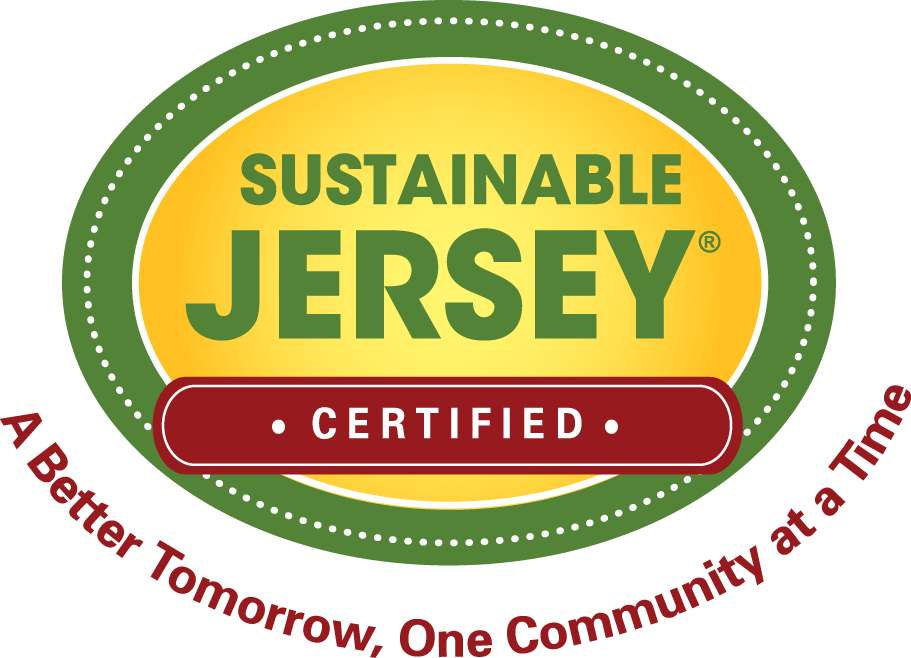Sustainability in Action
In the Summer 2024 issue of the Sustainable Jersey Newsletter:
- Delran Green Team Leads Community Effort to Reopen Lake Lonnie (Burlington County)
- Municipalities Reach Residents with Energy Efficiency Outreach Campaigns through the Sustainable Jersey-PSE&G Energy Efficiency Partnership Program
- Cape May City Elementary School Prioritizes Staff Health and Wellness (Cape May County)
- Municipalities Take Steps to Make Winter Road Maintenance More Sustainable
- Municipalities Maximize Savings on Clean Energy Projects
Delran Green Team Leads Community Effort to Reopen Lake Lonnie (Burlington County)
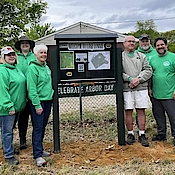
In May 2024, Lake Lonnie was reopened thanks to the leadership of the Delran Green Team (Sustainable Delran) and the hard work and contributions of an inspired community.
The idea for the project started two years prior, when members of the green team and a few local high school students wanted to open the trails. They generated interest in their project by holding community hikes in the area. Delran Township applied and received a $2,000 Sustainable Jersey Grant funded by the PSEG Foundation to support improvements.
With funding and a plan, the good idea was embraced by a network of leaders who volunteered their time to make the project a reality. The partners in the project included residents, members of the Veterans of Foreign Wars Post 3020, Delran Fire Department, Delran Fire Company #2, Delran Township School District, Delran High School students, Burlington County and Delran Township - Municipal Government.
Debra Hammond, chair of Delran Green Team said, “When we started the project, we were surprised at how many people didn't know about the park. It was great to see how the idea grew and was embraced by our neighbors who came out to help. With a reopened Lake Lonnie, we have access to a nice, wooded space with a lake that will add to the quality of life of our residents for generations to come.”
Lake Lonnie had its heyday in the early 1950s to 1968 when it was a popular swimming facility with lifeguards, a beach, pavilions, picnic groves, restrooms and concessions. In the 1970s, the township purchased Lake Lonnie with state funding from the Green Acres Program. Over time the area became wooded and mostly unused.
To begin the Lake Lonnie project, volunteers used GPS equipment, borrowed from Burlington County, to map the trails. The Delran Fire Department cleared the trails of fallen trees and branches. The new trails were marked with tree safe paint. Teams of volunteers cleaned trash, filling 27 bags in 2024. Another cleanup is planned for September 21, 2024. The Delran High School Ornithology Club installed bird and bat houses constructed in the Delran Innovation and Fabrication Lab (FabLab) to help increase wildlife within the park. Volunteers from VFW Post 3020 cleared away debris to open an area for picnic tables and access to the beach enabling visitors to fish. A new park kiosk and gate were added at the entrance. Geocaches are being added around the park so visitors can navigate to a specific set of GPS coordinates to find the geocache marker at that location. Delran Township is certified at the bronze-level with Sustainable Jersey. Collaborative efforts between municipalities and schools can result in both entities getting points toward Sustainable Jersey certification.
Municipalities Reach Residents with Energy Efficiency Outreach Campaigns through the Sustainable Jersey-PSE&G Energy Efficiency Partnership Program
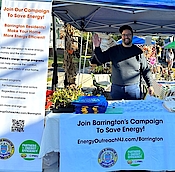
Municipalities participating in the Sustainable Jersey-PSE&G Partnership Program are making a demonstrated impact across the state by helping residents identify how their home might be wasting energy and pointing them to the available programs and incentives to help.
The Sustainable Jersey-PSE&G Partnership Program provides support, resources and funding for municipalities to implement residential and commercial outreach campaigns, and to improve energy efficiency in municipal buildings. Ten towns were selected for the first residential cohort in Spring 2023: Audubon; Barrington; Glen Rock; Haddonfield; Irvington; Montclair; Moorestown; Orange; Princeton; and Somerville. In addition to a municipal campaign website, these towns receive a free, customized video, a direct mailing and signage and informational materials to promote their campaign.
In May 2024, the boroughs of Audubon, Barrington and Haddonfield collaborated to host a free webinar to educate their communities about PSE&G’s residential energy efficiency programs. A representative from PSE&G discussed the existing programs and the Home Energy Assessment Tool. Moorestown Township held three in-person information sessions at the Moorestown Library that included a representative from PSE&G and members of Sustainable Moorestown. “Our green team's focus is to help Moorestown become a more environmentally friendly community,” explained Chuck Sides of Sustainable Moorestown. “The PSE&G residential energy efficiency programs provide a great opportunity for all the residents of Moorestown to save energy and money, which is a benefit to all of us.”
In addition to community events, municipalities have reached residents with informational materials and banners placed in high-traffic areas. In Glen Rock Borough, residents received a letter from Mayor Kristine Morieko about the Glen Rock energy efficiency outreach campaign and the available energy efficiency programs. The Township of Irvington hung a large banner across the front of the Town Hall building to promote the Irvington Residential Energy Efficiency Outreach Campaign. In addition, Irvington provided the informational flyer in English and Haitian Creole to reach as many community members as possible with energy saving information.
The Sustainable Jersey-PSE&G Partnership Program application period is now open. When applying to the program, each municipality selects the type of preferred assistance they want. The options include Residential Energy Efficiency Outreach Campaign; Technical Assistance for Energy Efficiency in Municipal Facilities; and Commercial Energy Efficiency Outreach Campaign. School districts are also eligible to apply for Technical Assistance for Energy Efficiency in School Facilities on a rolling basis.
Interested municipalities and school districts are encouraged to check their eligibility and apply. The municipal application deadline is October 31, 2024. Low-and moderate-income, overburdened and distressed municipalities accepted into the program will receive priority for some grants.
Cape May City Elementary School Prioritizes Staff Health and Wellness (Cape May County)
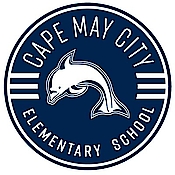
From providing Tai Chi, yoga and exercise classes, to nutrition lectures and blood pressure monitoring, the Cape May City Elementary School prioritizes staff health and wellness. With the support of a $2,000 Sustainable Jersey Grant funded by the New Jersey Education Association (NJEA), the school implemented a staff incentive program called “Well, Well, Well! Fitness for Staff.”
Led by Tiffany Bohn, the Cape May City Elementary School Nurse and Green Team/Wellness Council Co-President, the wellness program included yoga classes, exercise classes, use of the school pool, access to guest speakers and experts in Tai Chi and breathwork. Each staff member was given a punch card and a flyer explaining the activities they could do to earn card punches. Staff who completed their punch card were then eligible for $25 gift cards. Staff members also participated as the exercise leaders. Art teacher Sharon Fruchtman led the yoga classes and physical education teacher and certified CrossFit instructor, Thomas Holden, held classes at his Hold-On Fitness gym.
At Cape May City Elementary School, the green team and the Wellness Council meet in conjunction to lead Sustainable Jersey actions and wellness initiatives. The group is made-up of administrators, Board members, teachers, parents, paraprofessionals and students. Cape May City Elementary School is certified at the silver-level with Sustainable Jersey for Schools. The school received 10 certification points towards their 2023 certification for completing the action: Staff Wellness Program. The Sustainable Jersey NJEA Grant cycle is currently open; the deadline for submitting an application is October 28, 2024. This cycle will award ten $10,000 project grants to districts and schools and forty $2,000 grants to support school green teams.
Municipalities Take Steps to Make Winter Road Maintenance More Sustainable
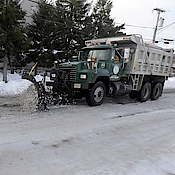
For the 2024 Sustainable Jersey certification application cycle, five towns (Chatham Borough, East Windsor Township, Lakewood Township, Plainsboro Township, and Red Bank Borough) have demonstrated how they are working toward making winter road maintenance more sustainable by balancing the need of safety with the need to protect water quality, human health, aquatic life and infrastructure.
In 2023, Sustainable Jersey introduced a new certification action: Winter Best Practices to Reduce Road Salt Impacts. This action helps a municipality determine the amount of salt applied to its roadways and provides guidance on how to use monitoring, education, training and implementation of best management practices to safely reduce the amount used over time. The action awards 5, 10 or 15 points depending on the number of activities completed.
Deborah Kratzer, an environmental scientist with the New Jersey Department of Environmental Protection, spearheaded the development of the action. She said, “The cumulative impact of salt used on roads is adding to the pollution of New Jersey’s water. Increased salinity in our environment jeopardizes human health, corrodes bridges and other road infrastructure and vehicles and degrades water quality. We designed this action to assist a municipality in improving the efficiency of salt applications and to allow residents to move safely through communities after a winter storm. We hope that with better education and the use of best management practices and monitoring, municipalities will be able to safely reduce the quantity and cost of salt use.”
To receive points for the action, the municipalities documented the steps they are taking. For example, Chatham Borough, Lakewood Township and Plainsboro Township annually train municipal staff involved in road salt application on best management practices. In addition to the training, Lakewood Township staff were also provided with a presentation on liquid anti-icing procedures by Anthony Ventura of the Lakewood Township Road Repair and Maintenance crew. Also known as brining, anti-icing improves winter salt practices because it’s more effective, uses less salt, and saves money compared to using dry salt.
Chatham Borough created a road salt inventory which required the municipality to monitor road salt reduction results for a year and present it to community members. The towns also receive points for completing Winter Road Maintenance Best Management Practice (BMP) to prevent overuse of winter salt. Plainsboro Township Director of Public Works Neil Blitz implemented new procedures for winter operations. When a storm is forecasted, he does a pre-storm evaluation to estimate the number of vehicles and materials needed to properly manage the storm. This allows for timely application of anti-icing agents before the storm begins, reducing the need for salt during and after the event. Plainsboro Township has also improved snow removal operations by using snow fencing to prevent drifting and accumulation of snow on the roads, thus avoiding the need to apply extra salt.
For certified communities, completion of the Winter Best Practices to Reduce Road Salt Impacts Action can count toward a Gold Star Standard in Water. To learn more, review the Winter Best Practices to Reduce Road Salt Webinar presentation and request the link to watch the recorded webinar.
Municipalities Maximize Savings on Clean Energy Projects
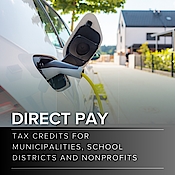
Municipalities and schools are using a new way to maximize savings for clean energy projects that are planned or completed. The Direct Pay Program, included in the Inflation Reduction Act of 2022, allows tax-exempt entities to capture tax credits for clean energy projects. Eligible projects include electric vehicles and electric vehicle charging infrastructure and renewable energy projects, including solar, wind and geothermal. Projects such as Community Solar, and ones that use Combined Heat and Power, as well as energy storage and microgrid projects also qualify for Direct Pay.
The tax credits for tax-exempt entities can be stacked with New Jersey's Clean Energy Program (NJCEP) incentives and utility incentive programs, which promote increased energy efficiency and renewable energy adoption. Many Sustainable Jersey municipalities and schools also participate in NJCEP’s electric vehicle incentive programs such as: RGGI MHD EV Charging Program; Multi Unit Dwelling (MUD) EV Charge Incentive; EV Tourism; and the Clean Fleet EV Incentive Program.
Review the full list of Direct Pay eligible tax credits here. Direct Pay is funded for ten years and local governments that have completed eligible projects in 2023 have until November 15, 2024, to file with the Internal Revenue Service (IRS) for these tax credits. For more information visit: Direct Pay Tax Credits for Municipalities, School Districts and Nonprofits.
